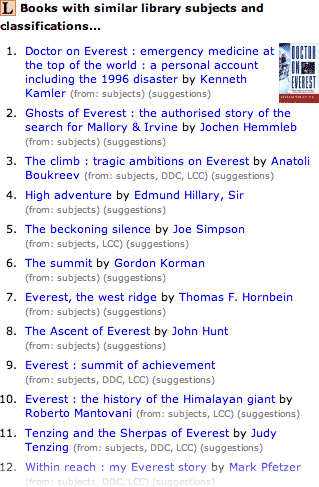
The many faces of John
Abby and I have hired John McGrath (user: JohnMcGrath), the man behind Wordie and Squirl, as a full-time developer. LibraryThing isn’t “eating” either site, both of which will remain independent, but we’re getting their developer.
I’ve blogged about Squirl and Wordie before*. Squirl, which he co-founded with Steve de Brun, is “LibraryThing for collectibles.” You can catalog things like scrimshaw and Pez dispensers. Someone entered their Hobo sculptures. You can do books too although—between you and me—LibraryThing does them better.
Squirl caught my eye when it came out. The guy lived in my town! (Portland, ME is not exactly a Web 2.0 mecca). More importantly, it was the rare (semi-)competitor that “didn’t suck®.” But Wordie is my favorite. Billed as “Flickr without the pictures,” Wordie is basically LibraryThing for people who collect words. Here is my list of products named after their (purported) place of origin and another users’ words that describe flow.**

John attempts to entertain Liam. Doesn’t he look French?
I was impressed by the idea; it’s silly in a good way. And I appreciate the way he put it together–quicky and guided by users. When MESDA asked me to talk about building web aps, I invited John to split my time. We ended up saying the same thing, differently. With Wordie especially, John had come to embrace playful, breakneck and user-guided development, but he was a little more careful about it.***
Over the next months with John, you can expect things to get smoother. Our code and databases, the core parts of which have been done by one person, has acquired a fair bit of “cruft.” Cleaning this out may slow us down in the short run, but there are two of us now, and a cleaner, more orderly under-programming will provide a better platform to do what LibraryThing is known for–relentless, playful, creative and user-assisted innovation.
Incidentally, John did not replace Chris. Although John’s got good Unix chops, he’s not a database administrator. (This week, however, he’s been playing one on TV.) A one-time Java developer, John developed Squirl and Wordie in Ruby on Rails****. In joining LibraryThing, John has been forced to cage his agile mind in the rubber prison of functional PHP programming. He’s taking it like a man.
So, welcome to John. Although we’ve started out with a couple months’ employment contract—there’s a chance he’ll have to take off—I expect him to be around a while, do some great work and make you guys happy.
First up, John, together with a superstar contractor, is going to be making everyone unhappy, taking the site down for a few hours. He will announce the time later on today. Don’t kill the messenger. The action is necessary and will increase the system’s underlying stability, which has not been very good in the last few days.
*According to John, the LT plug was actually a big factor in Wordie’s success. Wordie eventually landed in the Wall Street Journal, but on Christmas Day. That’s like making a hole-in-one when your best friend is looking the other way.
**Anyone who uses boustrophedon is a friend of mine, and lo and behold 15 other people have it on their lists!
***If John was Socrates, I was Diogenes, “the insane Socrates.” Diogenes threw aside convention by living in a tub and defecating in the street. I don’t use Subversion. The parallels are unmistakable.
****The Java link is Paul Graham’s great talk on “Great Hackers,” which is, inter alia, a savagely funny attack on Java developers. I was looking for similar pages about hating Ruby, to tweak John, and all I could find were pages like that one—”I hate it because it’s spoiled me.” Damn. Can something be so universally acclaimed and STILL be good? Note the blogger’s sexist but not wrong comparison: “Coding in [Rails] is like talking to a intelligent, beautiful woman. Coding in PHP is like talking to a pretty but stupid girl. Coding in ASP.NET***** is like trying to explain quantum mechanics to a miserable failure.”
*****Another of our competitors is in .NET, something Microsoft has started touting. Look, a site with 1-5% of LibraryThing’s books, traffic and users runs on our software! Paul Graham’s anecdote applies here:
“A couple years ago a venture capitalist friend told me about a new startup he was involved with. It sounded promising. But the next time I talked to him, he said they’d decided to build their software on Windows NT, and had just hired an eminent Windows NT developer to be their chief technical officer. When I heard this, I thought, these guys are doomed. One, the CTO couldn’t be a first rate hacker, because to become an eminent Windows NT developer he would have had to use NT voluntarily, multiple times, and I couldn’t imagine a great hacker doing that; and two, even if he was good, he’d have a hard time hiring anyone good to work for him if the project had to be built on NT.”
 We’ve always pushed the idea that your books are you. Well, now you can see yourself on a single page.
We’ve always pushed the idea that your books are you. Well, now you can see yourself on a single page.

 Our friends over at Abe have created two new “rooms,” one for
Our friends over at Abe have created two new “rooms,” one for  The many faces of John
The many faces of John John attempts to entertain Liam. Doesn’t he look French?
John attempts to entertain Liam. Doesn’t he look French?

 I’ve added a new and often powerful recommendation engine. It has a long and awkward name: Books with similar library subjects and classifications.* So far, I’ve only got it on
I’ve added a new and often powerful recommendation engine. It has a long and awkward name: Books with similar library subjects and classifications.* So far, I’ve only got it on 